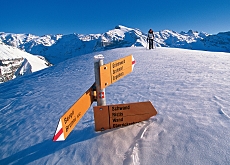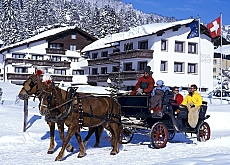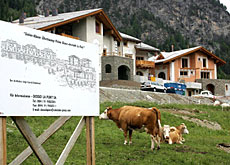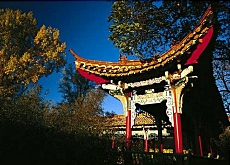Altitude keeps Switzerland on top

The country's top tourism promoter tells swissinfo how he is using Switzerland's natural – and virtual – strengths to keep the country competitive.
Jürg Schmid, director of Switzerland Tourism, the Swiss national tourist office, has been buoyed by a slow but steady rise in tourist arrivals over the past couple of years.
Tourists spent 2.2 per cent more nights in Swiss accommodation in the first eight months of this year than they did in the same period for 2003, the last year statistics were compiled.
What’s more, a 1.1 per cent rise is forecast for the coming winter.
Switzerland Tourism hopes that skiers will come in droves to the Swiss Alps, paying heed to the new advertising campaign, “More Winter”, which boasts that Swiss resorts are higher than those of neighbouring countries, thus offering more reliable snow conditions.
swissinfo: Are you playing on skiers’ fears of global warming?
Jürg Schmid: Not really, but our mountains are higher than elsewhere [in the Alps] and therefore the downhill runs are a little bit longer and our villages are at a higher altitude.
The result is you have a bit more of a winter feeling and that’s one of our key advantages. It would be silly if we didn’t promote the fact.
swissinfo: In the peak season it is hard to find a bed in many popular Swiss ski resorts. Hotels are disappearing and being replaced by private apartments and chalets, which are only occupied three weeks a year. Is this the biggest challenge?
J.S.: That’s definitely a challenge for the politicians. When the price of land goes up, hotel owners cannot get the financing to build or upgrade.
[Full-time] residents in the Engadine valley have expressed the wish to put a stop to the building of more apartments, which I support. Tourism needs a balance between hotels and holiday apartments.
swissinfo: Across the country and over the whole year, however, occupancy rates are low. There are simply too many hotels. Has the online hotel rating system you launched earlier this year improved competitiveness?
J.S.: We have become the first [national tourist office] to give guests the chance to rate hotels online. Such ratings have a high credibility and the internet allows us to communicate personal impressions or remarks.
We expect to have 3,000-4,000 ratings by the middle of next year, which will give you a good impression of every large hotel in the country.
swissinfo: How else do you plan to use the internet to market Switzerland?
J.S.: The internet has become the main source of information on travel. Our website has 40,000-50,000 visitors daily, and we expect a 20 per cent rise in visitors by next year.
We think with the rise of bandwidth you will be able to watch a short film on every hotel and resort instead of just being able to look at a couple of pictures, which is often the case now.
swissinfo: You’re entering a partnership soon with a new organisation called Historic Switzerland, which will promote heritage hotels, old steamboats and railways. Is tourism heritage of interest to more than just a tiny minority of potential visitors?
J.S.: Yes. History sells. It’s believed that Switzerland was the cradle of modern tourism. The first Thomas Cook tour took place here. You can still travel on steamboats that are 100 years old and stay in hotels that go back to the time when the British would spend their entire winters in Switzerland.
There is currently a Swiss historic hotels association and we want to support it, but it should offer the whole historic tourism experience. There could be a strong demand for this product in the United States, but not only there.
swissinfo: As the country’s top promoter of destination Switzerland, where do you spend your holidays?
J.S.: There are many beautiful places in the world, but I spend my winter vacation with my family in Lenzerheide in canton Graubünden. We were in canton Valais this summer – in Saas-Fee and the Aletsch area, which has the longest glacier in the Alps.
swissinfo: What was the last place you visited abroad?
J.S.: I’ve been on a few study trips. It was interesting to see how in southern Turkey, for example, they manage resorts with 1,200 rooms. They are the same size as entire mountain villages in Switzerland!
swissinfo-interview: Dale Bechtel
The Swiss tourist industry generated SFr22.6 billion ($17.3 billion) in income last year, accounting for 5.1% of the country’s gross domestic product.
Even though the winter season is only four months long, it is responsible for half the total income.
Tourism is the third-largest export sector behind the engineering and chemical industries.
Zermatt draws the most winter guests with 687,679 overnight stays (winter 02/03).

In compliance with the JTI standards
More: SWI swissinfo.ch certified by the Journalism Trust Initiative




You can find an overview of ongoing debates with our journalists here . Please join us!
If you want to start a conversation about a topic raised in this article or want to report factual errors, email us at english@swissinfo.ch.